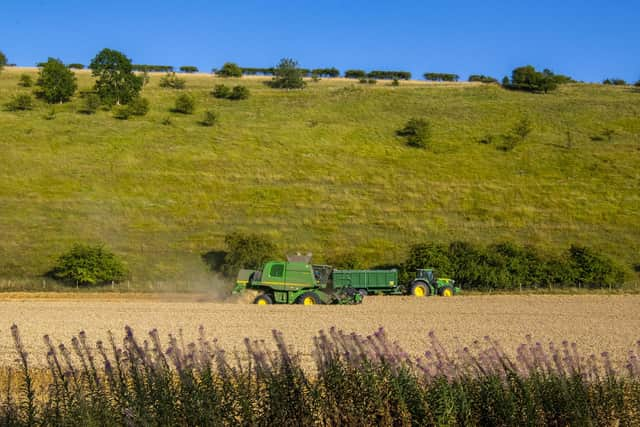Food prices rise by £600 with climate change to blame but farmers blast imports and supermarkets
Rising costs due to extreme weather have kept food inflation high throughout 2022 and 2023 even as energy prices decreased.
Recent flooding in the UK left cereal, potato and other crops rotting underwater, farmers have said, while extreme heat and drought in Spain has damaged olive harvests and pushed up the price of olive oil by around 50 per cent.
Advertisement
Hide AdAdvertisement
Hide AdOther staple products like sugar, rice and tomatoes have been impacted by extreme weather, with food inflation rising to around 20 per cent this spring.


With the UK importing nearly half of its food, and climate change increasing in severity, experts from the universities of Sheffield, Exeter and Bournemouth have warned that food prices are likely to remain high.
Professor Wyn Morgan, from the University of Sheffield, said: “It is clear from the evidence that climate change is an increasingly prominent feature amongst the drivers of food price inflation.
“In 2022, energy costs dominated the headlines and these fed through to a high headline rate of inflation for food.
Advertisement
Hide AdAdvertisement
Hide Ad“And yet, as energy costs have fallen back, climate change has emerged as a bigger driver of inflation for food over the last two years.”
However, Yorkshire farmers said other factors such as the need to import, input costs faced by farmers and deals being struck by supermarkets were also having an effect.
Barrie Crowther, a farmer from the village of Walton, near Wakefield, said: “While over the last few years I have been a bit sceptical about climate change, in the last two or three years I am having a few second thoughts.
“ Our last two years of trying to harvest potatoes in unprecedented waterlogged fields have left me thinking we always managed to harvest them in years gone by even without modern machinery.
Advertisement
Hide AdAdvertisement
Hide Ad“There can be no doubt this and droughts in other countries have had an effect on food prices. The cost of fertiliz er and other inputs have made crops quite a bit more expensive to grow.
“ Unfortunately these increased costs for farmers are hard to recoup when food is grown on contract or for supermarkets. However, I can see no point in this government’s policy of taking our land out of production while importing more food from abroad.”
Researchers calculated that since the start of 2022, £361 of increases are attributable to climate change and £244 to oil and gas .
Dr Pete Falloon, climate service lead for food, farming and natural environment at the Met Office, said that generally, the more global temperatures rise, the lower crop yields will be.
Advertisement
Hide AdAdvertisement
Hide AdHowever, Robert and Emma Sturdy, arable farmers in Malton, said food costs are not solely driven by climate change and growing more in the UK would lead to cheaper prices fo r custome rs.
Mrs Sturdy said: “It’s a combination of things. Input costs are high throughout the country and food has hist orically been cheap.
“ The public must be prepared to pay a fair price for their food, supermarkets must pay a fair price to producers, and we simply must be looking to produce more food from the good land we have in this country.
“Ultimately this would help reduce costs for the consumer.”
Advertisement
Hide AdAdvertisement
Hide AdLast week Prime Minister Rishi Sunak told the Global Food Security Summit that the Government will launch a new virtual hub to link UK scientists with others around the world to help develop, among other initiatives, climate-resistant crops.
Comment: Page 12.
